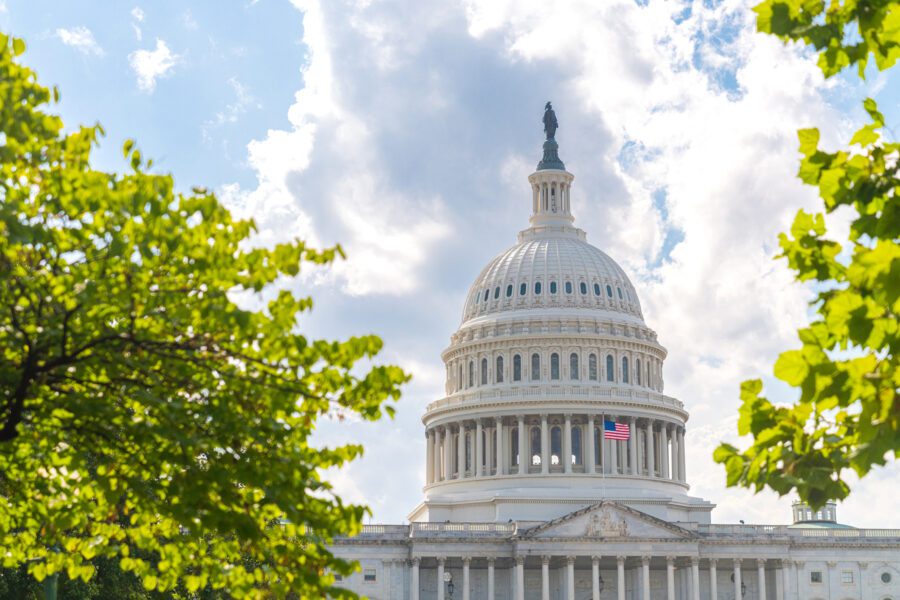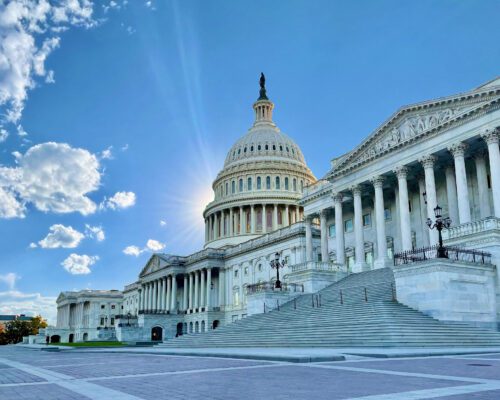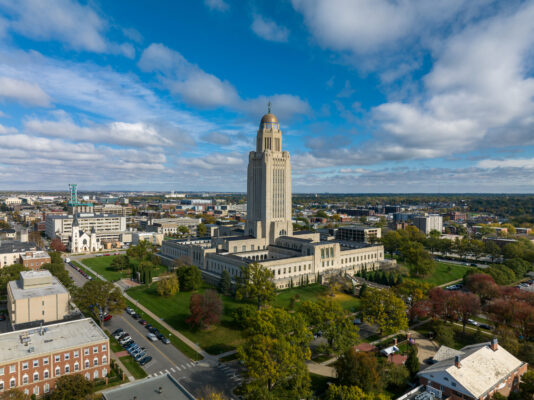In 2024, the ERLC stood at the forefront of critical social, moral, and policy issues facing our world. From navigating complex abortion ballot measures across multiple states to addressing international religious freedom concerns, we demonstrated our commitment to advocating for Southern Baptists’ biblical values in the public square. The year brought significant challenges and developments across four key areas: the protection of life, religious liberty, marriage and family, and human dignity.
The following items demonstrate how the ERLC advanced its mission given by Southern Baptists across multiple fronts in 2024.
Life
Comprehensive response to abortion ballot measures
Ten states put abortion-related measures on their ballots for the 2024 election season. The results painted a complex picture: three states (South Dakota, Nebraska, and Florida) upheld or strengthened restrictions on abortions while seven states voted to expand or protect abortion access.
The ERLC mobilized a comprehensive response in partnership with Baptist state conventions. We equipped SBC churches with vital resources including:
- detailed policy explainers,
- church bulletin inserts,
- and targeted prayer guides.
These materials helped congregations understand the complex issues at stake and engage their communities. Moving forward after the mixed results, the ERLC maintains its steadfast commitment to protect life at all stages and will continue working to defeat harmful pro-abortion policies at both the federal and state level.
Pro-life policy priorities sent to the Trump administration
Following President Trump’s election, the ERLC advocated for life-affirming policies by sending a letter to the president-elect. The letter outlined specific actions to protect life, including:
- Reinstating restrictions on government funding for abortion providers;
- restoring the Mexico City Policy to prevent federal support of international abortion services;
- reestablishing protections for healthcare workers’ conscience rights;
- defunding abortion facilities;
- and supporting legislation that funds pregnancy resource centers and adoption services.
These recommendations reflect our commitment to stand for life through both policy reform and supporting mothers and families to choose life.
Pro-life provisions in government funding
Each year, the ERLC conducts an in-depth review of the text of all 24 draft appropriations (i.e., government funding) bills. We then advocate for these bills to retain important pro-life language restricting abortion and the inclusion of new language to this end. Throughout the negotiation process, there is always a chance that such language will be removed.
In Fiscal Year 2024, the ERLC was glad to see all longstanding pro-life policies maintained, despite significant pushback from pro-abortion legislators. Additionally, ahead of Fiscal Year 2025 negotiations, the ERLC sent a letter advocating for pro-life policies to be maintained. In this letter, President Brent Leatherwood stated:
The inclusion of both existing baseline and new pro-life riders is not charting a new course in federal policy, but rather, is an essential continuation along the path set by the Founding Fathers in both the Declaration of Independence and the First Amendment, and retained by every Congress since. There is no political justification that should ever prevail over continuing vital federal pro-life protections that have been maintained for decades, each of which show respect for life and for deeply-held moral and religious beliefs.
The ERLC continues to engage in the appropriations negotiation process, pushing for the inclusion of pro-life policies that restrict government funding from going toward abortion at every level.
Religious Liberty
Congress reauthorizes international commission on religious freedom
A crucial victory for international religious freedom came with the reauthorization of the United States Commission on International Religious Freedom (USCIRF). As the commission faced its Sep. 30, 2024, expiration date, the ERLC advocated for Congress to take action. Since its establishment through the International Religious Freedom Act of 1998, USCIRF has served as a vital bipartisan commission monitoring and defending religious liberty worldwide.
Working through the IRF Roundtable’s Congressional Working Group, the ERLC spearheaded efforts to ensure USCIRF’s continuation.
- Our coalition built strong bipartisan support for reauthorization, engaging lawmakers across the political spectrum.
- These efforts culminated in a two-year reauthorization with robust backing from both parties—195 Democrats and 170 Republicans joined forces to preserve the commission.
Though permanent reauthorization is needed, this successful temporary reauthorization demonstrates that protecting religious liberty remains a cornerstone of American foreign policy. This renewal ensures USCIRF can continue its critical work of:
- monitoring religious persecution,
- advocating for those facing discrimination,
- and advising U.S. policymakers on promoting religious freedom worldwide.
Federal agencies finalized multiple federal rules, some accounting for religious liberty concerns expressed by the ERLC
Over the past year, the Biden administration has released and finalized several federal rules that affect issues Southern Baptists care about including abortion, religious liberty, and the protection of children. These rules seek to push the administration’s anti-life, pro-“gender transition” agenda through enacting standards for new laws and revising old guidance for how federal agencies implement existing law.
The ERLC has continually sought to ensure federal funding is not used to fund or otherwise facilitate abortions, gender transitions, or other objectionable practices that violate the consciences of taxpayers. While many of the rules perpetuated by the Biden administration remain harmful, there have been a few areas where promising changes have been implemented, in part due to the ERLC’s comments. Two examples of this are as follows:
Designated Placement Requirements Under Titles IV-E and IV-B for LGBTQI+ Children: Although we still have significant concerns with this rule, it is important to note that several changes were made in response to our comments.
- The finalized rule more clearly relays that states cannot require providers to become “designated providers” to serve LGBTQ-identifying children and that “affirming” a child’s gender identity is a separate matter from providing “safe and appropriate” care.
- The final rule also includes new language that affirm the religious freedom protections afforded to faith-based providers.
You can read the ERLC’s comments here.
Nondiscrimination in Health Programs and Activities: Although we still have significant concerns regarding the implementation of this rule and will be supporting litigation to overturn it, some improvements were made in the final rule as a result of our comments.
- The final rule clarifies that faith-based organizations cannot be mandated to perform abortions and includes a new deference to clinical judgment that offers protections for clinicians who do not believe an abortion should be provided for any number of reasons.
You can read the ERLC’s comments here.
The ERLC looks forward to working with the Trump administration to undo the harmful effects of these rules and continue to push forward a pro-religious liberty agenda.
Marriage and Family
NDAA includes first-ever federal language prohibiting “gender transitions” for children
Each year, Congress must pass the National Defense Authorization Act (NDAA) which authorizes the Department of Defense to operate and to utilize its budget. Without proper language included in the NDAA, taxpayer dollars could be used to fund harmful activities Southern Baptists fundamentally oppose. As a result, the ERLC engages in negotiations to support pro-life and anti-”gender transition” policies.
One of the biggest wins in the marriage and family policy area in 2024 occurred in the 2025 NDAA negotiations. A new provision was included that prohibited TRICARE, the federal insurance that covers servicemembers and their dependents, from covering “gender transition” surgeries and prescriptions for minors.
The ERLC will continue to advocate each year for this policy and others that promote God’s design for marriage and gender to be included in the NDAA and other legislation.
Supreme Court hears arguments in Tennessee “gender transition” case
A pivotal battle for the protection of children unfolded at the Supreme Court in United States v. Skrmetti. This landmark case challenged Tennessee’s law safeguarding minors from medical procedures and interventions aimed at altering their biological sex, with the Biden administration joining efforts to overturn these protections.
Standing firm on Southern Baptists’ convictions regarding biblical truth and biological reality, the ERLC partnered with the Tennessee Baptist Mission Board to file an amicus brief defending the state’s law. Our position, grounded in resolutions from the Southern Baptist Convention and the doctrinal framework of the Baptist Faith and Message 2000, argued that protecting children from irreversible medical interventions serves their best interests and upholds parental rights.
The broader implications of gender ideology extended beyond medical procedures to athletics, prompting additional ERLC advocacy. We supported U.S. Sen. Marsha Blackburn and 22 fellow senators in pressing NCAA President Charlie Baker to maintain fair competition in women’s sports. The initiative called for policies ensuring that women’s collegiate athletics remain reserved for biological females, protecting decades of hard-won opportunities for female athletes.
Together, these efforts reflect our commitment to defending both vulnerable children and the God-given distinctions between male and female in all spheres of society.
Tax changes to support families
Congress plans to review the expiring provisions of the 2017 Tax Cuts and Jobs Act through a process called “reconciliation” next year. In preparation, the ERLC filed comments in support of pro-family tax policies for legislators to consider, aimed at strengthening families and promoting a culture of life. Our proposal outlines five strategic priorities that would remove financial barriers for families while reinforcing vital charitable institutions. Key elements include:
- Remove financial barriers for choosing life, such as through a one-time baby bonus or improvements to the Child Tax Credit;
- improve the Adoption Tax Credit, such as by supporting refundability of this credit;
- reduce marriage penalties in existing federal tax law to encourage God’s design for the family;
- support pregnancy resource centers;
- and support a Universal Charitable Deduction to encourage giving to faith-based organizations.
Together, these reforms would create a tax code that better supports life-affirming choices and thriving families.
Human Dignity
Letters sent to the United Nations, President Biden, and congressional leadership in support of Israel
Marking the first anniversary of Hamas’ Oct. 7 terrorist attack, the ERLC reinforced Southern Baptists’ unwavering support for Israel through coordinated advocacy at the highest levels of government. We issued letters, alongside SBC President Clint Pressley, emphasizing the moral imperative of standing with Israel during this critical time to:
- the United Nations,
- President Biden,
- and Congressional leadership.
Our position, grounded in Southern Baptist convictions and formally articulated through a resolution at the June annual meeting, centers on two key principles:
- unequivocal opposition to acts of aggression against Israel, and
- firm support for Israel’s sovereign right to self-defense.
This stance reflects both our theological understanding of Israel’s significance and our commitment to defending human dignity against terrorist violence.
The DEA moves to reclassify marijuana
In a concerning shift in federal drug policy, the Drug Enforcement Administration (DEA) proposed reclassifying marijuana from Schedule I to Schedule III under the Controlled Substances Act. This change would effectively recognize marijuana as having accepted medical uses while maintaining some restrictions—a dramatic departure from its current classification as a substance with no accepted medical use and high potential for abuse.
The ERLC took a strong stand against this reclassification, submitting detailed public comments to the DEA outlining our concerns. Our opposition stems from compelling evidence about marijuana’s adverse effects on public health and social stability. Research consistently shows that marijuana use can impair:
- cognitive development,
- mental health,
- and family relationships.
Reclassification would send a dangerous message minimizing the drug’s risks, potentially leading to increased use and addiction rates. Our position reflects the Southern Baptist commitment to caring for those struggling with addiction while maintaining clear standards that protect individuals, families, and communities from substance abuse.
Looking back and looking forward
As we look back on 2024, the ERLC’s work reflects our unwavering commitment to advancing Southern Baptists’ biblical values in the public square, even amid significant cultural and political challenges. We will continue to serve as a strong voice for Southern Baptists on critical moral and ethical issues. Looking ahead, we remain dedicated to our mission of:
- promoting a culture of life,
- protecting religious liberty,
- championing God’s good design for marriage and family,
- and honoring the human dignity of all as made in God’s image.
And as we serve Southern Baptists’ interests, ultimately, we will work toward bringing the hope of Jesus Christ to the public square.









